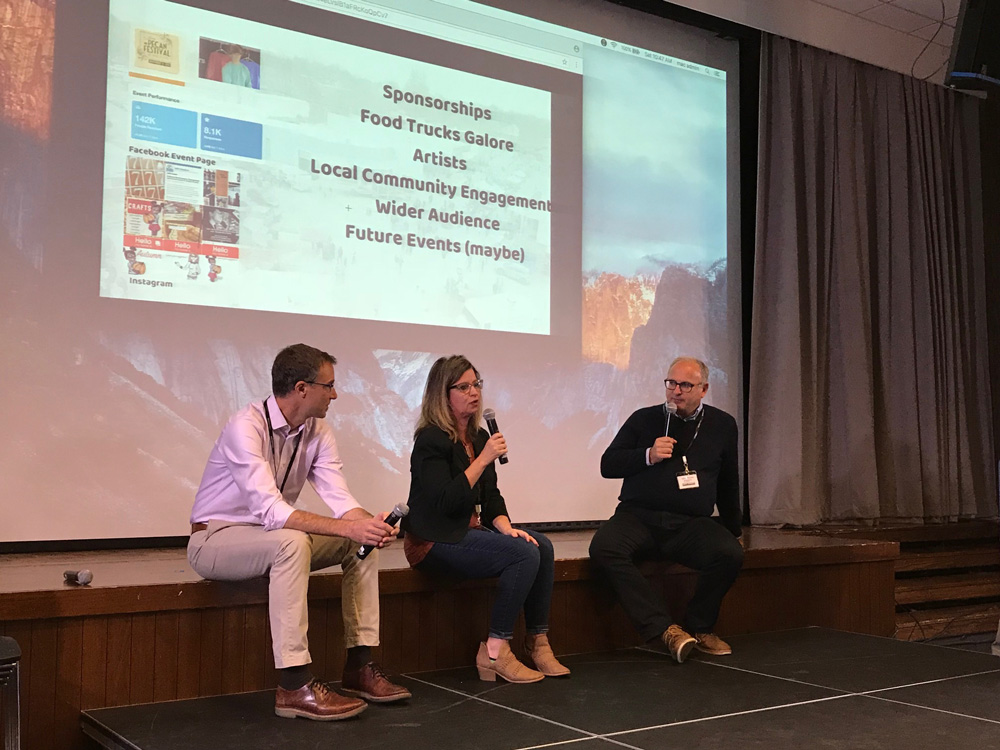Publishers Use Events to Engage Readers More & Build Their Brands
When Dawn Shelton launched The Luther Register, advertising dollars came in slow, forcing her to get creative to raise money,

When Dawn Shelton launched The Luther Register, advertising dollars came in slow, forcing her to get creative to raise money, as well as increase brand awareness and community engagement.
Last year, she launched the annual Luther Pecan Festival in her small Oklahoma town, about a 30-minute drive northeast of Oklahoma City. People were eager to support her.
“People forked over money to me, forked over thousands of dollars in sponsorships,” Shelton said during a panel on audience engagement and events, part of LION Summit 2018. “That’s our income. Also helped me get known in the community: ‘That crazy festival girl who also does the newspaper.’ ”
Sponsors each paid between $250 to $2,500.
Shelton’s event became a tourist attraction, bringing an estimated 5,000 to 7,000 people to the town of 1,200.
Shelton is among the many publishers and decision makers at independent news outlets using events to diversify their revenue streams. Panelists Lance Knobel of Berkeleyside and Greg Hanscom of Crosscut also discussed why and how they host events in their communities.
Knobel, the co-founder of Berkeleyside, talked about their premier event, Uncharted: The Berkeley Festival of Ideas.
“We did it for three reasons,” Knobel said. “One, we wanted another stream of revenue. Second, we thought one of the things that really distinguishes Berkeley is ideas. And also we’re a place where sort of nostalgia weighs heavily. We wanted something to do that says ‘looking forward.’ The third reason, I have a lot of experience in this area. It was applying that experience.”
The two-day festival hosts sessions that have a guest and a host holding a conversation in front of the audience (Knobel said he typically dislikes group panels, though he was happy to be on this one). It also features live performances, workshops, food and drinks. Knobel said it costs between $70,000 and $80,000 to produce the event, and they gross about $120,000.
“We do very, very well with sponsorship,” Knobel said. “Most of the sponsors would probably never advertise with us,” he said, citing property developers and tech companies as examples.
“It’s been a great way to pull in new money,” Knobel said. “My caution is: It is a lot of work, and there are real costs. We do it pretty efficiently. It cost a lot of money. Unlike running an online news site, there are real cost. You have costs of venues; you have costs of catering; you have marketing costs.”
Both Shelton and Knobel said they regret initially creating the events with branding separate from their news sites.
“When we created it in 2013, we thought Berkeleyside would always be about Berkeleyside,” said Knobel. “We are now trying to infuse Berkeleyside everywhere” in the Festival of Ideas.
Hanscom, the executive editor of Crosscut, said they packaged festivals and other events with their outlet from the beginning.
“We do a lot of events. We do everything from trivia nights at our local breweries to community idea labs where we bring people together to tackle issues ranging from Seattle’s terrible traffic to the projected onslaught of climate refugees to the Pacific Northwest,” he said.
They also hold issue-based discussions on topics such as racism and gentrification, and they throw election-night parties.
Other early staples that continue include an annual festival and an awards ceremony for Seattle’s movers and shakers called the Crosscut Courage Awards.
“It’s a way to celebrate the well-known luminaries in the area,” Hanscom said. “It’s also a fantastic way to get people out to have breakfast with you at 7 a.m.”
Hanscom said the awards breakfast grosses about $150,000; the Crosscut Festival grosses about $250,000. Most of the revenue is generated from sponsorships.
Tips
Know your costs: Events can be expensive to hosts. Publishers should understand the expenses involved before moving forward, including key jobs to help the event run efficiently.
Know what it takes: Do you need a marketing team for the event? Should you hire sound engineers, videographers or any other staff to ensure the event’s success? Publishers should identify the critical roles needed to put on an event.
Know your community: What’s missing? How would the event help the community you serve? What is your community’s niche? Just like you identify content for your news outlet’s audience, you should be able to identify events that would be marketable in your area.
Connect the dots: Make sure to let people know that your news agency is behind the event..
Free is the way to go: If possible, never pay speaking fees. Paying for expenses associated with the events, such as travel and lodging, is acceptable but bypass the honoraria.
Tap into new dollars: An event may be an opportunity to draw funding from businesses that would not typically advertise with your news outlet.
Sign up for the weekly newsletter
Join the LION mailing list to get our weekly roundup of opportunities and resources for news entrepreneurs. View our most recent issues.
Related Articles
BoiseDev’s winning secret to selling newsletter ads: Only local news, only local ads
The site earns 60 percent of its advertising revenue through its high-open-rate email projects, in partnership with local ad agencies.
AI adoption: How Lede AI helps small publishers quickly generate content readers love
Helping news organizations leverage artificial intelligence with a tool that puts their readers and staff first
Social is down, newsletters are up: How audiences are finding LIONs in 2024
Changes to social media and search prompt publishers to shift strategy.
